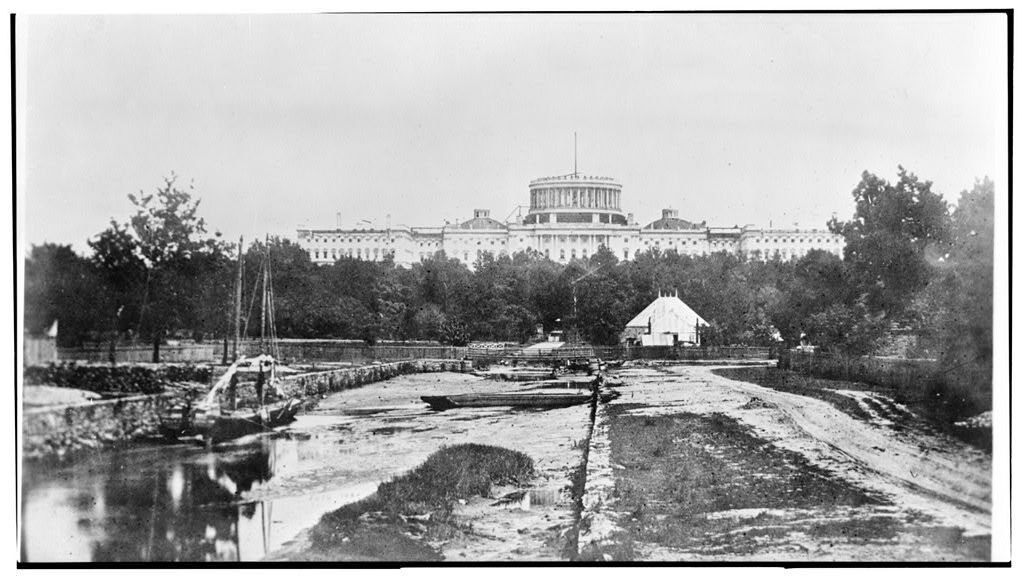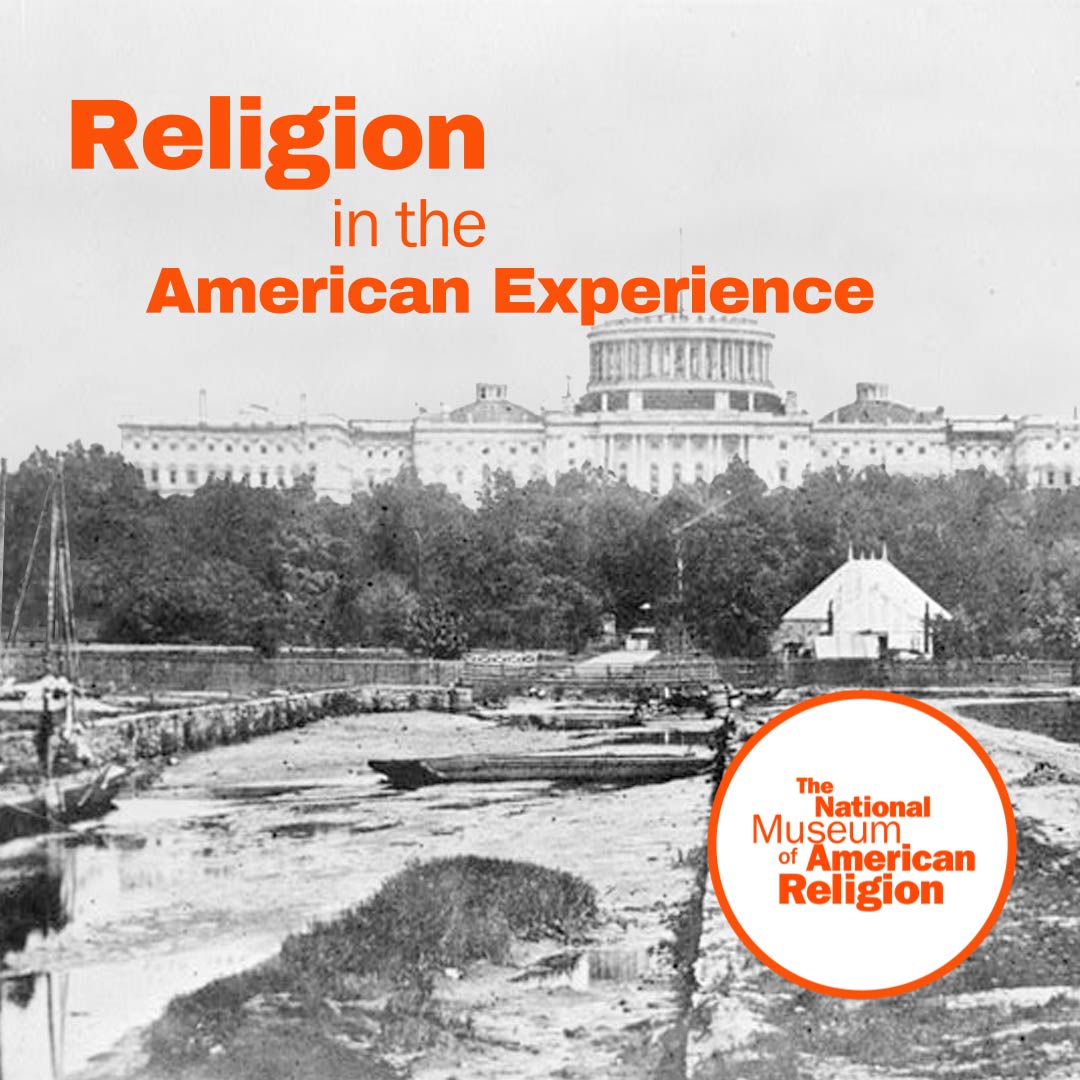
17.5K
Downloads
79
Episodes
Learning from scholars and every day Americans about what religion has done to America and what America has done to religion, helping all of us better comprehend and perpetuate the American experiment in self-government, including what is perhaps its greatest innovation and the essence of the American project: religious freedom as defined by the Constitution’s Article VI and First Amendment religion clauses.
Episodes
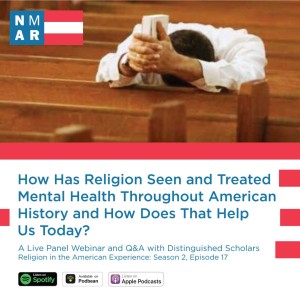
Tuesday Apr 20, 2021
How Has Religion Seen and Treated Mental Illness Throughout American History?
Tuesday Apr 20, 2021
Tuesday Apr 20, 2021
There seems to be some sort of mental health crisis, especially among younger people, in the United States – with many experts blaming social media. Teen suicide is in the news, depression seems to be an ever-growing menace. Then COVID hit last year, which has exacerbated the problem.
Mental health has a special place as seen through the lens of religion – the sicknesses one can’t see, the depression, the darkness, all things “of the soul” are things religion naturally addresses.
At the Museum, we believe it will be instructive for all of us to better understand how religion has seen and addressed mental health throughout U.S. history so that we are better equipped to address the mental health challenges of our present moment.
This morning we have a fantastic panel of scholars:
Dr. Judith Weisenfeld, Agate Brown and George L. Collord Professor of Religion at Princeton University. She is the author of Hollywood Be Thy Name: African American Religion in American Film, 1929-1949, African American Women and Christian Activism: New York’s Black YWCA, 1905-1945, and New World A-Coming: Black Religion and Racial Identity during the Great Migration. Her current research examines the intersections of psychiatry, race, and African American religion in the late 19th and early 20th centuries;
Dr. Andrew Walker-Cornetta, Postdoctoral Research Associate at the John C. Danforth Center on Religion and Politics at Washington University in St. Louis. His research focuses on how religious communities have shaped the history of disability in the United States. In August, he will begin a position as Assistant Professor in the Department of Religious Studies at Georgia State University.
Dr. Barbara McClure, Associate Professor of Pastoral Theology and Practice at Brite Divinity School at Texas Christian University, and author of Emotions: Problems and Promise for Human Flourishing. Her primary interests lie primarily in the meaning of and means toward human flourishing, respecting both the fractured character of human nature and the religious impulse for wholeness and coherence;
Dr. Kameelah Rashad, Founder and President of Muslim Wellness Foundation (MWF) and the founding co-Director of the National Black Muslim COVID Coalition. She is a Visiting Assistant Professor of Psychology and Muslim Studies at Chicago Theological Seminary;
And, Dr. Elizabeth Hayes Alvarez, Associate Professor of Religion at Temple University, and author of The Valiant Woman: The Virgin Mary in Nineteenth-Century American Culture. She is currently a Scattergood Fellow working on a book entitled Challenging the Great Physician: Christian Responses to the Rise of Psychiatry in America.
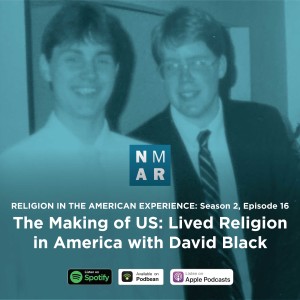
Monday Apr 12, 2021
The Making of US: Lived Religion in America with David Black
Monday Apr 12, 2021
Monday Apr 12, 2021
Listen to David Black, an attorney from Great Falls, Virginia, talk about religion's influence on him during his early life in the 1970s and 1980s and then during college and beyond, and how that makes him who he is today as an actor on the American stage.
Religion has profoundly influenced the sweeping American narrative, from the times of the Indigenous peoples to the present. The start-up digital-first National Museum of American Religion is the nationally recognized center for presenting, interpreting, and educating the public about what religion has done to Americans and what Americans have done to religion. It invites all to explore the role of religion and the freedom that fuels it, in shaping the social, political, economic and cultural lives of Americans and thus America itself.
The podcast series "Religion in the American Experience" is releasing the first episode of its new program, “The Making of US: Lived Religion in America”, which collects and disseminates personal stories about religion’s influence on the lives of the nation’s citizens. It is through hearing these stories that we can better comprehend ourselves, our communities and the nation, and see more clearly how the American project can endure.
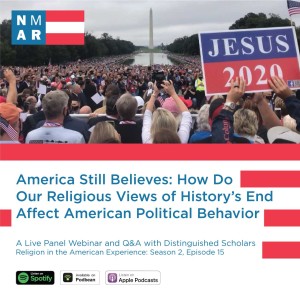
Monday Apr 05, 2021
Monday Apr 05, 2021
We have all been part of the recent contentious U.S. presidential election, which finally ended in the transfer of power in January of this year.
At the Museum we observed that, as usual, a colossal amount of energy, money, time, emotion, concern, debate, argument, Tweets, posts, letter-writing, editorializing, and protest were invested in the election and its outcome. America was all in. That is, Americans have a deep and meaningful allegiance to perfecting, preserving and perpetuating the American experiment in self-government. Some religious beliefs even tie into the country’s founding & purpose.
At the same time, however, we also noted that while that patriotic allegiance is powerful, for a large percentage of Americans, perhaps no longer a majority – at least according to a very recent report, there is most likely something that commands a greater allegiance – and that would be their faith. Many faiths have end-times theologies, including Christianity, which believes in an approaching end of the world and the return of Jesus Christ. So, it occurred to us that religious beliefs about the end of the world may play a large but hidden role in our politics – past, present and future.
If we can understand some of the beliefs about the end of the world and their effects on political behavior, we will be better equipped as citizens trying to see to the success of the American project in the 21st century.
Today we have a fantastic panel of scholars who will, in an hour!, help us scrape the surface, maybe do a deep dive or two:
- Matthew Sutton, the Berry Family Distinguished Professor in the Liberal Arts at Washington State and author of American Apocalypse: A History of Modern Evangelicalism
- Matt Harper, Associate Professor of History and Africana Studies at Mercer University and author of End of Days
- Christopher Blythe, Research Associate at Brigham Young University’s Maxwell Institute and author of Terrible Revolution: Latter-day Saints and the American Apocalypse
- Arlene Sanchez-Walsh, Professor of Religious Studies at Azusa Pacific University and author of Latino Pentecostal Identity: Evangelical Faith, Self, and Society
- Jacqueline Keeler, writer and activist of Dineh and Yankton Dakota heritage, co-founder of Eradicating Offensive Native Mascotry (EONM), and author Standoff: Standing Rock, the Bundy Movement, and the American Story of Occupation, Sovereignty and the Fight for Sacred Lands
- Larry Perry, Assistant Professor of Religious Studies and Africana Studies at the University of Tennessee, Knoxville; currently working on a book entitled A Black Spiritual Leftist: Howard Thurman and the Religious Left’s Unfinished Business of Race Relations
- William Dinges, Ordinary Professor of Religion and Culture at The Catholic University of America and co-author of Young Adult Catholics: Religion in the Culture of Choice
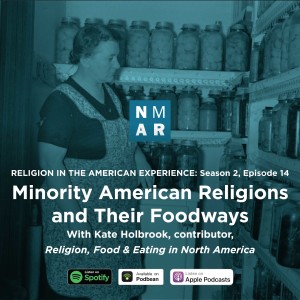
Monday Mar 29, 2021
Minority American Religions and Their Foodways
Monday Mar 29, 2021
Monday Mar 29, 2021
Food sustains physical life, and as such is of critical importance to each of us. Some in the country have an abundance; hunger gnaws at others: in which group we find ourselves determines much of our current existence. What we eat also touches on other aspects of our lives besides “need”: celebrations, emotional comfort, health, family traditions, and connections or “breaking bread” with others. For the purposes of this podcast series, we are interested in uncovering and understanding the connections between religion and food in the United States – what are they, what do they mean, and how significant are they?
To do a deep dive into just one aspect of this fascinating and meaningful subject, we have as our guest Kate Holbrook, currently managing historian in the Church History Department of The Church of Jesus Christ of Latter-day Saints. Dr. Holbrook received her master’s degree at Harvard Divinity School and PhD in religion and society from Boston University in 2014. She is the author of many articles and chapters, and co-editor of several books, including At the Pulpit: 150 Years of Discourses by Latter-day Saint Women, Women and Mormonism: Historical and Contemporary Perspectives, and The First Fifty Years of Relief Society. For our discussion today, we are looking at the chapter she wrote in the book Religion, Food & Eating in North America, called edited by Benjamin Zeller, Marie Dallam, Reid Neilson, and Nora Rubel published in 2014.
Today’s episode will help us better understand what religion has done to America, and what America has done to religion, and we trust that as a result, listeners will see how indispensable the idea of religious freedom as a governing principle, is, to the United States and its ability to fulfill its purposes in the world.
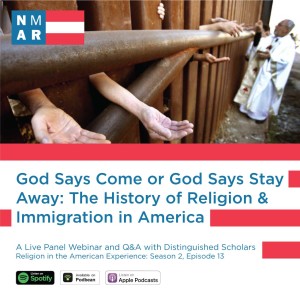
Monday Mar 22, 2021
Monday Mar 22, 2021
America is a nation of immigrants, except for the Indigenous Peoples who were here before European colonization and the Africans brought here against their will and sold as enslaved people.
I just read this in the newspaper a few days ago “Administration short of shelter space amid ‘overwhelming’ [immigration] surge: record number of unaccompanied minors being held in adult cells far longer than legally allowed.” This morning’s paper had another front page piece on the surge at our southern border. Immigration reform is a major policy task of the current administration.
It is also important to note that there has been a recent rise in attacks against Asian Americans, addressed in an editorial of a major national newspaper over the weekend.
We feel that a better understanding of how religious beliefs have influenced the attitudes and government policies towards immigrants throughout U.S. history can benefit us in our present moment.
Today we have a panel of fantastic scholars who will help us do a deep dive:
Melissa Borja, Assistant Professor in the Department of American Culture at the University of Michigan, and author of the forthcoming book Follow the New Way: Hmong Refugee Resettlement and Practice of American Religious Pluralism;
Grace Yukitch, Professor of Sociology at Quinnipiac University, and author of One Family Under God: Immigration Politics and Progressive Religion in America;
Fenggang Yang, Professor of Sociology at Purdue University, and author of Chinese Christians in America: Conversion, Assimilation, and Adhesive Identities;
Shari Rabin, Assistant Professor of Jewish Studies and Religion, and author of Jews on the Frontier: Religion and Mobility in Nineteenth-century America;
Kristy Nabhan-Warren, Professor and Chair in Catholic Studies at the University of Iowa, and author of the forthcoming book Meatpacking America: How Migration, Work, and Faith Unite and Divide the Heartland.
And, Nick Pruitt, Assistant Professor of History at Eastern Nazarene College and author of the forthcoming book Open Hearts, Closed Doors: Immigration Reform and the Waning of Mainline Protestantism.
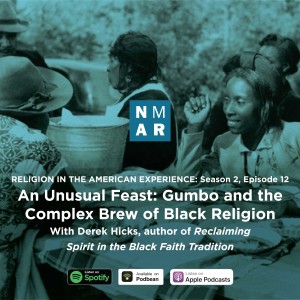
Monday Mar 15, 2021
An Unusual Feast: Gumbo and the Complex Brew of Black Religion
Monday Mar 15, 2021
Monday Mar 15, 2021
Food sustains physical life, and as such is of critical importance to each of us. Some in the country have an abundance; hunger or food insecurity gnaws at others: in which group we find ourselves determines much of our current existence. What we eat also touches on other aspects of our lives besides “need”: celebrations, emotional comfort, health, family traditions, and connections or “breaking bread” with others. For the purposes of this podcast series, we are interested in uncovering and understanding the connections between religion and food in the United States – what are they, what do they mean, and how significant are they?
To do a deep dive into just one aspect of this fascinating and meaningful subject, we have as our guest Derek Hicks, Associate Professor of Religion and Culture at Wake Forest University’s Divinity School. Hicks teaches and researches broadly in the areas of African American religion, religion in North America, race, the body, religion and foodways, theory and method in the study of religion, Black and Womanist theologies, and cultural studies. Dr. Hicks is the author of the book Reclaiming Spirit in the Black Faith Tradition and is currently working on a second monograph entitled Feeding Flesh and Spirit: Religion, Food, and the Saga of Race in Black America. He also contributed chapters for the book Blacks and Whites in Christian America: How Racial Discrimination Shapes Religious Convictions.
For our discussion today, we are looking at his chapter “Gumbo and the Complex Brew of Black Religion” from the book Religion, Food & Eating in North America, edited by Benjamin Zeller, Marie Dallam, Reid Neilson, and Nora Rubel.
I am confident that today’s podcast will help us better understand what religion has done to America, and what America has done to religion, and we trust that as a result, listeners will see how indispensable the idea of religious freedom as a governing principle, is, to the United States and its ability to fulfill its purposes in the world.
We encourage our listeners to visit storyofamericanreligion.org and register for future podcast notifications under the “signup” tab.
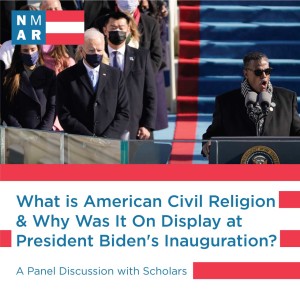
Monday Mar 08, 2021
Monday Mar 08, 2021
It has been noted that religion was prominent at President Joe Biden’s inauguration, as it often is at presidential inaugurations, in traditional ways: the oath of office was taken with the president’s hand on the family bible; the invocation was offered by a Catholic priest, the benediction by an African Methodist Episcopal Church pastor; musical numbers with threads of religion in them, including Amazing Grace, were performed; and Old Testament scripture and God were invoked by President Biden in his address.
Yet, religious tests for public office are banned by the Constitution, America may have no state church, and we are sensitive to the intertwining of government and religion. Adding to that mix, the Pew Research Center reported a few years ago that “the U.S. is steadily becoming less Christian and less religiously observant” AND there is a fully developed idea in the public square, that religion is part of, not a solution to, America’s problems.
“American Civil Religion” (in quotations), the idea that a nonsectarian quasi-religious faith exists within the U.S. with sacred symbols drawn from national history, may be helpful to us at our present moment in American history. We can use it as a lens to view the recent inauguration and our current politics generally, as we participate in the American experiment in self-government, founded 245 years ago, saved 156 years ago, and work to see it successfully extended into the future for ourselves and children.
What are we to think of American Civil Religion? What is its history? What does it mean? How does it motivate us? What are the ramifications? Is it on the upswing or is it fading away? What has it done to us? What does it do to us? How does it drive our behavior, political or otherwise?
Today’s panel consists of four scholars who will help us with these questions:
Dr. Nichole R. Phillips is Associate Professor in the Practice of Sociology of Religion and Culture, Director of the Black Church Studies Program at Emory University; and author of Patriotism Black and White: The Color of American Exceptionalism.
Dr. Philip Gorski is Professor of Sociology at Yale University and author of American Covenant: A History of Civil Religion from the Puritans to the Present
Dr. John Carlson is Associate Professor of Religious Studies at Arizona State University where he directs the Center for the Study of Religion and Conflict. He is co-editor of From Jeremiad to Jihad: Religion, Violence and America.
Dr. Lisa Barnett is Assistant Professor of American Religious History at Phillips Theological Seminary in Tulsa, Oklahoma
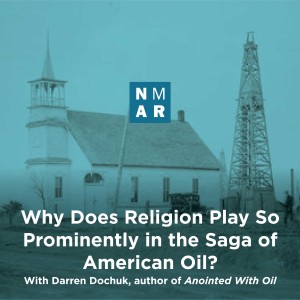
Monday Mar 01, 2021
Why Does Religion Play So Prominently in the Saga of American Oil?
Monday Mar 01, 2021
Monday Mar 01, 2021
From Edwin Drake’s 1859 discovery of oil in Pennsylvania to our 21st century entanglements in the Middle East, oil’s influence on America is vast. Religion’s role in this American oil story is outsized, and relatively unknown, and understanding it will help us more fully comprehend what religion has done to America, and what America has done to religion—which is understanding America itself.
We trust that at the conclusion of this podcast, listeners will have a deeper appreciation of religious freedom as a governing principle in the United States and will see to its protection as an indispensable part of the fragile American experiment in self-government.
Today we have with us Darren Dochuk, the Andrew V. Tackes College Professor of History at The University of Notre Dame, and author of Anointed With Oil: How Christianity and Crude Made Modern America. Mr. Dochuk’s primary research interest is 20th century United States, with an emphasis on the intersections of religion, politics, and the rising influence of the American west and Sunbelt Southwest in national life. He is the author, editor and co-editor of many books, including From Bible Belt to Sunbelt: Plain-Folk Religion, Grassroots Politics, and the Rise of Evangelical Conservatism, God’s Businessmen: Entrepreneurial Evangelicals in Depression and War, and Faith in the New Millennium: The Future of Religion and American Politics. Professor Dochuk received his PhD from The University of Notre Dame.
To join the cause in establishing the "digital first" National Museum of American Religion, visit storyofamericanreligion.org/sign-up and sign up for newsletters and podcast notifications.
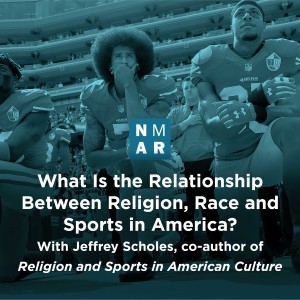
Monday Feb 22, 2021
What is the Relationship Between Religion, Race and Sports in America?
Monday Feb 22, 2021
Monday Feb 22, 2021
Sports is everywhere in America, as we all know: the Super Bowl, the Masters, the World Series, the Stanley Cup, the Olympics, the NBA, MLB, NFL, youth travel sports, and the list goes on and on. So if we understand sports, we may understand America. For us on the podcast series, the question is “does religion factor into sports”? It seems the answer is a loud “yes.”
In 1976 Sports Illustrated published a three-part essay by the famed sports commentator Frank DeFord titled “Religion in Sport” in which he analyzed the cozy relationship between Christianity and sports in the United States, and it was in this article that he coined the term “sportianity”, writing this: it is almost as if a new denomination had been created: Sportianity. While Christian churches struggle with problems of declining attendance, falling contributions and now even reduction in membership, Sportianity appears to be taking off.” That same year Michael Novak published The Joy of Sports, articulating the religiosity embedded in the playing and cheering of sports.
This discussion will help us better understand what religion has done to America, and what America has done to religion, and we trust that as a result, listeners will see how indispensable the idea of religious freedom as a governing principle, is, to the United States and its ability to fulfill its purposes in the world.
Today to talk about religion and sports we have with us Jeffrey Scholes, associate professor in the Department of Philosophy at the University of Colorado – Colorado Springs, and author of the book Christianity, Race and Sport, to be published next year by Routledge Press. Professor Scholes’ research interests center on the relationship between religion and sports, and American political theology. He is the author of Vocation and the Politics of Work: Popular Theology in a Consumer Culture and co-author of Religion and Sports in American Culture.
Join us in building The National Museum of American Religion in the nation's capital, to open in 2026, on the 240th anniversary of Thomas Jefferson's immortal words "Almighty God hath created the mind free", by donating at storyofamericanreligion.org/contribute.
For a contribution of $200 or more you will receive a free copy of the book When Sorrow Comes: The Power of Sermons from Pearl Harbor to Black Lives Matter, by Melissa Matthes, professor of government at The United States Coast Guard Academy. Her forthcoming book reminds us that in the face of national crisis, faith leaders have incredible power to help Americans endure, even flourish, and further the work of improving the imperfect yet noble American experiment in self-government.
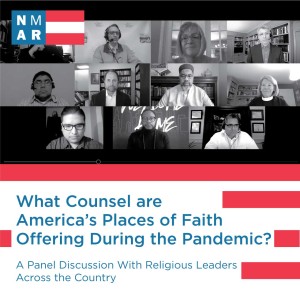
Monday Feb 15, 2021
Monday Feb 15, 2021
Our history is clear: religions and their leaders have always inspired Americans during times of national tragedy and crisis with their words – their sermons that give their people hope.
Today the country faces a raging global pandemic, now going on twelve months, and its staggering effects: death without loved ones near, unemployment, hunger, shuttered public schools, uncertainty, isolation, fear, and closed temples, mosques, synagogues, and churches.
What counsel have religious leaders been offering to their people in the face of the pandemic? We thought “Religion in the American Experience” could both capture history in real-time, AND be of service to the country, by convening a panel of American religious leaders to share what they have told their congregations and believers, with a broader national audience.
Today’s panel consists of ten religious leaders, some with national scope others with regional or local scope, and we thank them for their willingness to be with us. I will introduce each as we move through the hour-long panel.
The start-up National Museum of American Religion will be both the place of convening in Washington, DC, for discussions about current national issues where religion or the idea of religious freedom is in play, as we are doing today, AND the nationally recognized center for presenting, interpreting, and educating the public about what religion has done to America, and what America has done to religion, including the history of the revolutionary and indispensable idea of religious freedom as a governing principle in the United States.
Join us in building The National Museum of American Religion in the nation's capital, to open in 2026, on the 240th anniversary of Thomas Jefferson's immortal words "Almighty God hath created the mind free", capturing the American essence of religious freedom, by donating at storyofamericanreligion.org/contribute.
For a contribution of $200 or more you will receive a free copy of the book When Sorrow Comes: The Power of Sermons from Pearl Harbor to Black Lives Matter, by Melissa Matthes, professor of government at The United States Coast Guard Academy. Her forthcoming book reminds us that in the face of national crisis, faith leaders have incredible power to help Americans endure, even flourish, and further the work of improving the imperfect yet noble American experiment in self-government.
